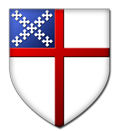About the Episcopal Church
 Welcome to the Episcopal Church—a community of faith that seeks to respond to the Gospel of Jesus Christ in word and deed. The Episcopal Church is the Province of the Anglican Communion in the United States, Honduras, Taiwan, Colombia, Ecuador, Haiti, the Dominican Republic, Venezuela, the British Virgin Islands and parts of Europe. It is a church of 1,798,042 baptized members. In keeping with Anglican tradition and theology, the Episcopal Church considers itself “Evangelical and Catholic.” We hope you join us!
Welcome to the Episcopal Church—a community of faith that seeks to respond to the Gospel of Jesus Christ in word and deed. The Episcopal Church is the Province of the Anglican Communion in the United States, Honduras, Taiwan, Colombia, Ecuador, Haiti, the Dominican Republic, Venezuela, the British Virgin Islands and parts of Europe. It is a church of 1,798,042 baptized members. In keeping with Anglican tradition and theology, the Episcopal Church considers itself “Evangelical and Catholic.” We hope you join us!
The church was organized shortly after the American Revolution when it was forced to separate from the Church of England, as Church of England clergy were required to swear allegiance to the British monarch. It became, in the words of the 1990 report of the Archbishop of Canterbury’s Group on the Episcopate, “the first Anglican Province outside the British Isles”. Today it is divided into nine provinces and has dioceses outside the U.S. in Taiwan, Central and South America, the Caribbean and Europe. The Episcopal Diocese of the Virgin Islands encompasses both American and British territory.
If you’d like to learn more about the Episcopal Church, please visit its website here
What We Believe
At the center of Episcopal belief and practice are the life, teachings and Resurrection of Jesus Christ. The doctrine of the Episcopal Church is found in the canon of scripture as understood in the Apostles’ and Nicene creeds and in the sacramental rites, the ordinal and catechism of the Book of Common Prayer.
Some of these teachings include:
- Belief that human beings “are part of God’s creation, made in the image of God,” and are therefore “free to make choices: to love, to reason, and to live in harmony with creation and with God.”
- Belief that sin, defined as “the seeking of our own will instead of the will of God,” has corrupted human nature, “thus distorting our relationship with God, with other people, and with all creation,” resulting in death.
- Belief that “sin has power over us because we lose our liberty when our relationship with God is distorted,” and that redemption is any act of God which “sets us free from the power of sin, evil, and death.”
- The doctrines of the Incarnation and Resurrection of Jesus Christ; Jesus Christ is fully human and fully God.
- Jesus provides forgiveness of sin and the way of eternal life for those who believe and are baptized.
- The Trinity: God the Father, God the Son (Jesus Christ), and God the Holy Spirit are one God in three distinct persons, collectively called the Holy Trinity (“three and yet one”).
- The Holy Scriptures, commonly called the Bible, consist of the Old Testament and the New Testament and were written by people “under the inspiration of the Holy Spirit.” The Apocrypha are additional books that are used in Christian worship, but not for the formation of doctrine.
- The Bible contains “all things necessary to salvation” and nothing can be taught as pertaining to salvation which cannot be proven by scripture.
- Sacraments are “outward and visible signs of God’s inward and spiritual grace.” The two necessary sacraments are Baptism and Holy Communion (the latter is also called the Eucharist, the Lord’s Supper, and the Mass). Infant baptism is practiced and encouraged. Holy Communion is celebrated each Lord’s Day (Sunday) and is open to all baptized persons.
- Other sacraments are confirmation, ordination, marriage, confession, and unction. Regarding these other sacraments the Book of Common Prayer states “Although they are means of grace, they are not necessary for all persons the same way that Baptism and the Eucharist are.”
- A general belief in an afterlife of Heaven and Hell. Heaven is defined as the resurrection of the faithful to eternal life in the presence of God. Hell is defined as “eternal death” due to a willful rejection of God.
- Emphasis on the contents of the Sermon on the Mount and on living out the Great Commandment to love God and to love one’s neighbor fully.
- Belief in an episcopal form of church government and in the offices and ministries of the early church, namely the threefold order of bishops, priests and deacons; both men and women are eligible for ordination to the clergy. Clergy are permitted to marry.
- Apostolic Succession: the belief that the Episcopal and wider Anglican bishops continue the apostolic tradition of the ancient church as spiritual heirs to the Twelve Apostles of Jesus Christ.
- Strong emphasis on prayer with specific reverence for the Lord’s Prayer both in its original form and as a model for all prayer; principal kinds of prayer include adoration, praise, thanksgiving, penitence, oblation, intercession, and petition.
- Observance of the ancient Church Year (Advent, Christmas, Lent, Easter, etc.) and the celebration of holy days dedicated to saints.
- Belief that grace is “God’s favor toward us, unearned and undeserved,” by which God “forgives our sins, enlightens our minds, stirs our hearts, and strengthens our wills,” and is continually conferred to Christians through the sacraments, prayer, and worship.
The full catechism is included in the Book of Common Prayer and is posted on the Episcopal Church website.
